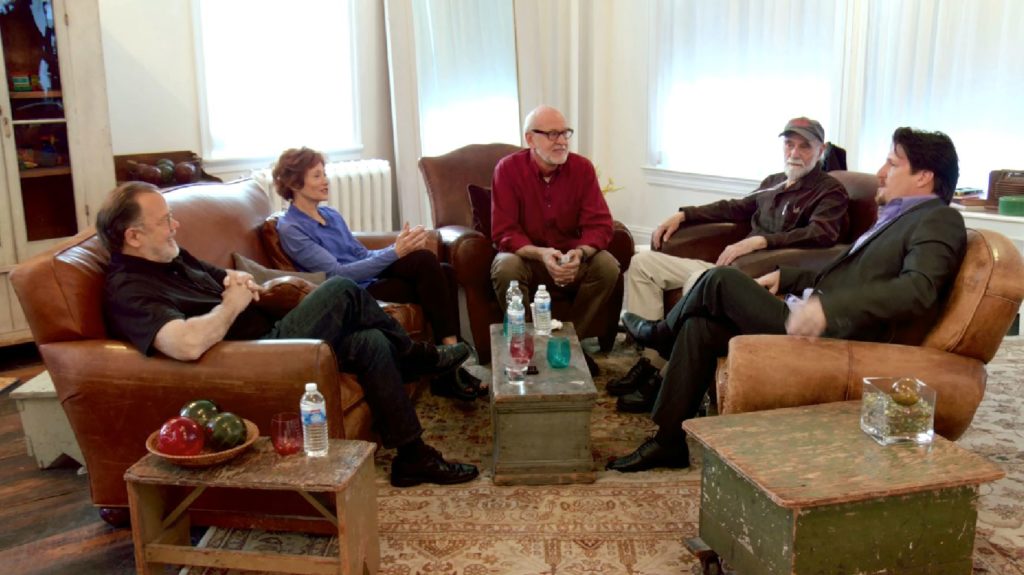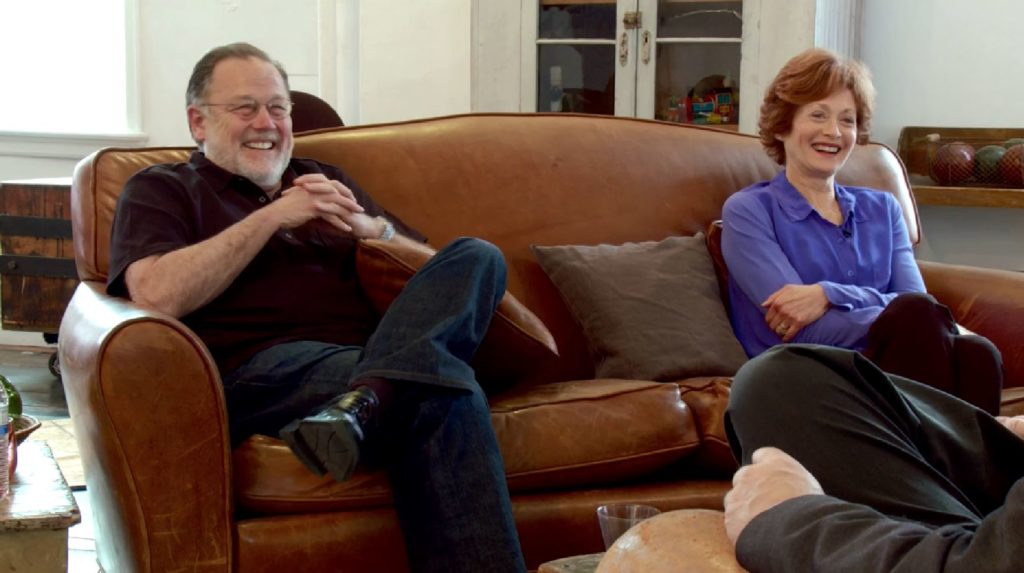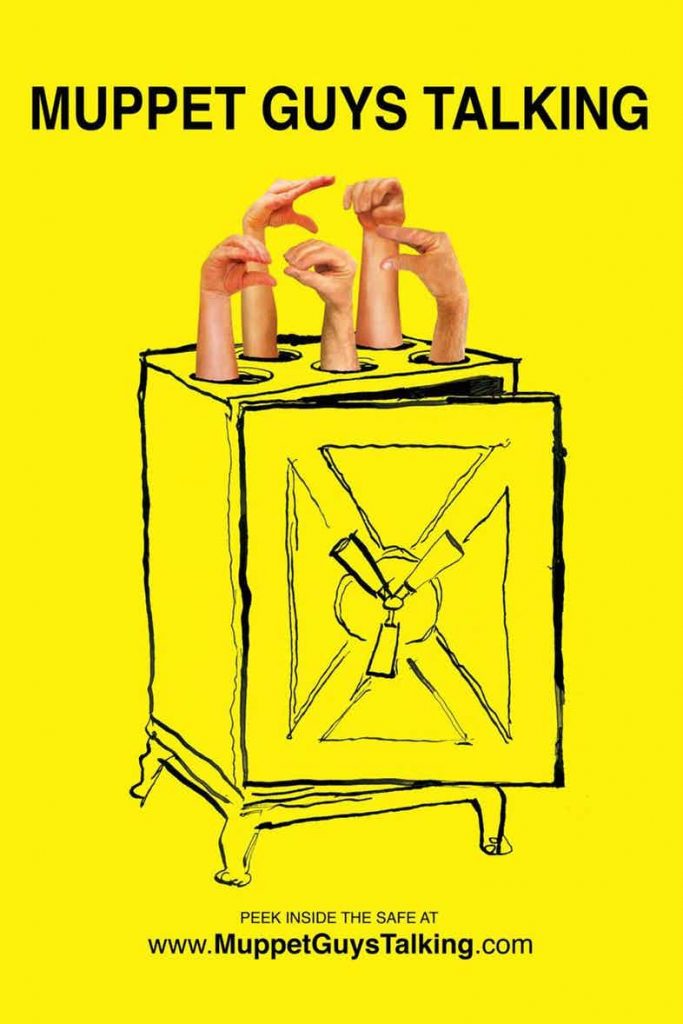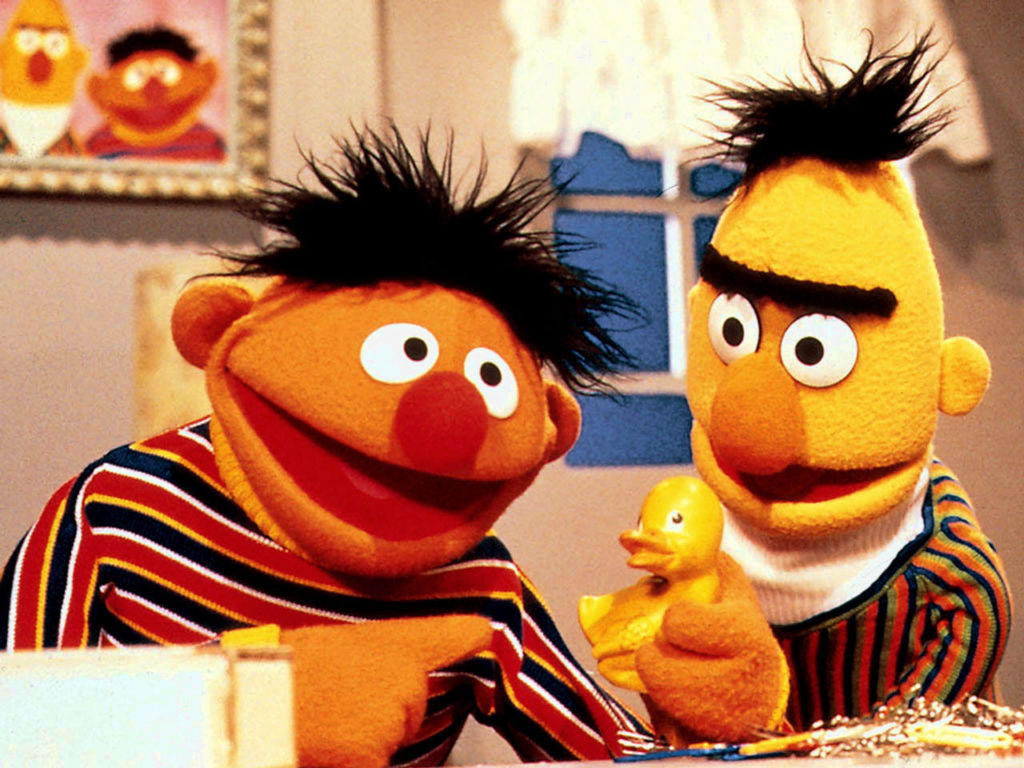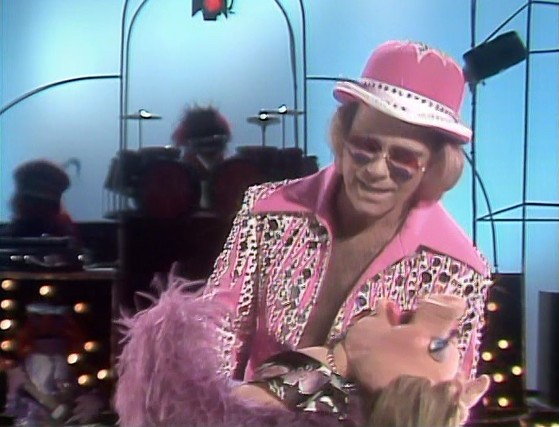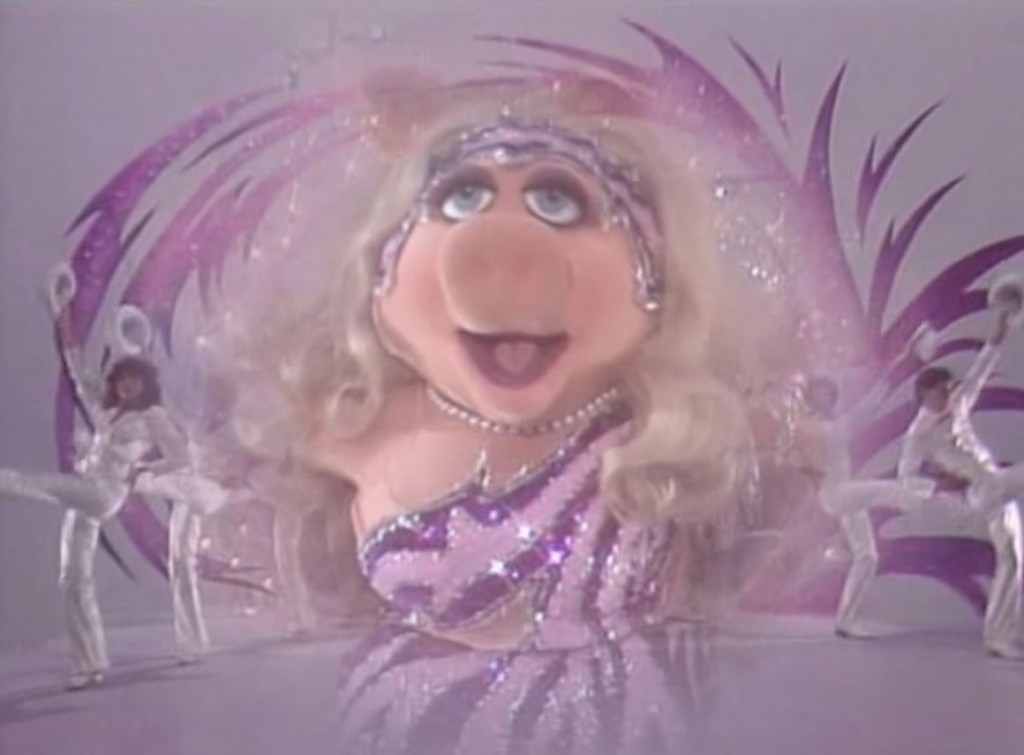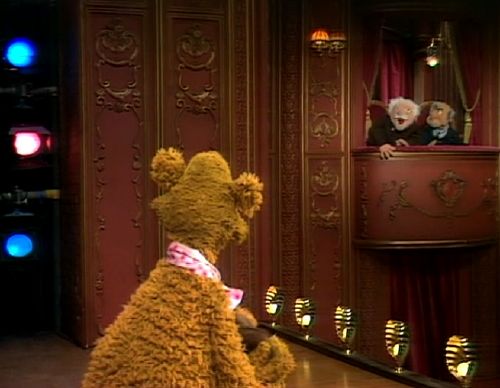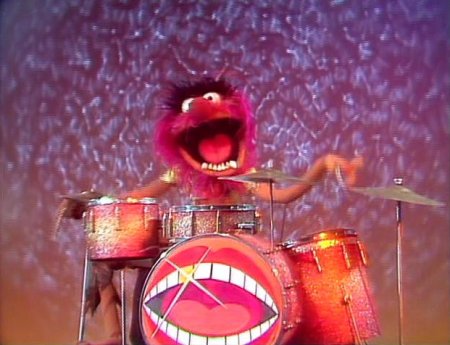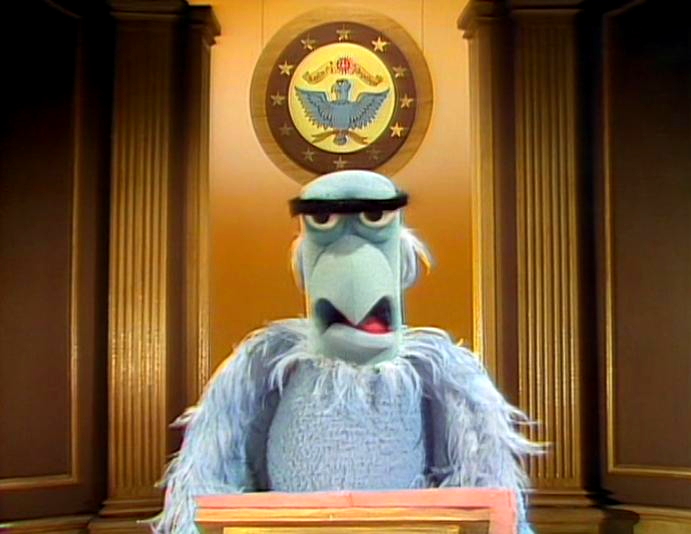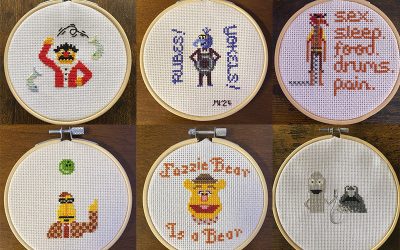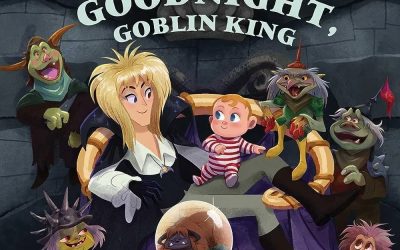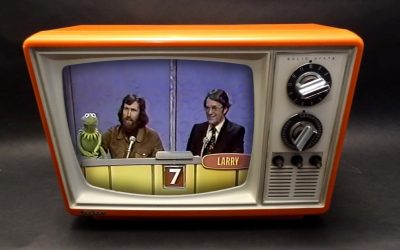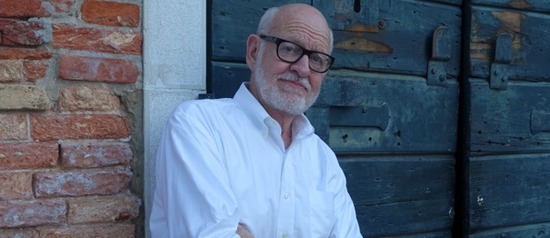
If you’re reading this, you already know who Frank Oz is, so this interview doesn’t need much of an introduction. He’s one of the founding fathers of the Muppets, and his brilliant performances and creative talents contributed greatly to making the Muppets an enduring phenomenon. He’s also the director of the new documentary Muppet Guys Talking, which will be available exclusively at MuppetGuysTalking.com on Friday, March 16. And now, the interview!
Tough Pigs: Frank, thank you for taking the time to talk to us. This is one of the biggest honors we’ve ever had in the ten-plus years we’ve been running this website. It’s a real thrill.
Frank Oz: That’s really nice of you guys, thank you. Where are you guys?
TP: We’re based in New York City.
FO: You are, okay. Well, thank you so much, that’s really nice to hear.
TP: Yeah, I’ve heard someone – Brian Jay Jones may have been the one who said it – that this is like talking to Paul McCartney, which is absolutely true for us.
FO: Yeah, but the trouble is, Brian never liked Paul McCartney.
TP: Oh no! I’ll have to ask him about that.
FO: Yeah. Brian just lies.
TP: That I’ve heard as well. Which is a really good trait for a biographer. It’s great when you’re writing non-fiction.
TP: So, we saw the Muppet Guys Talking documentary, and we loved it. It’s fantastic. It’s like candy to us, that kind of stuff.
FO: Thank you.
TP: Thank you for putting it together. The idea came from your wife [Victoria Labalme, the film’s co-producer], is that correct?
FO: Right. Actually, she never really grew up with Muppets. She never saw The Muppet Show or anything, but she did experience evenings and times when me and the other guys got together, and she’d never really seen this kind of atmosphere, where people were taking each other on, but still supporting each other, and being sardonic with each other, but still loving each other. And talking about how we all worked really, really hard but had fun at the same time, and because of Jim, learned how to do that always – working hard and having fun.
And at the same time, no jealousy, no politics, nothing. She’d never seen that kind of thing before, and she felt it was something that was important for people in the world to see, because people are not working that way all the time. Also, we’re very inclusive, and during this time in this country certainly the idea of inclusivity and collaboration, which is what we were used to – that kind of thing is not necessarily evident today.
TP: Watching the film really feels like hanging out with you guys for an hour. Was that kind of the idea?
FO: Yeah. That’s all it was. Just being ourselves, you know? And you can see at the coffee break, we didn’t change. We’re just who we were.
TP: Yeah, that was one of my favorite parts, I think, where you just left all that stuff in. Just everybody going to get bagels or whatever it was.
FO: Yeah, that’s who we are.
TP: Same thing with the bit about Dave [Goelz] stammering over his line and taking four or five takes, which, I don’t think I’ve ever seen a documentary leave that kind of thing in.
FO: I love that. As much as I can embarrass him, the happier I am.
TP: Yeah, as fans who know all of you guys and appreciate your work so much, it’s fun to be able to have that feeling like we’re right in the middle of that conversation. How did you decide which performers were going to sit around the table with you?
FO: Really the people who were with us longest. Billy is the exception because, oddly enough, after 20 years, he’s the new guy. But really it was the people who originated the characters, and Billy originated his own characters.
TP: Now that the seal has kind of been broken for you in making this kind of project, do you think you would ever do more, or release more of what you guys filmed? Maybe a sequel?
FO: Well, it’s not my place to do that, because I don’t own the characters, Disney does. And Sesame Street does. So it’s really not my place to do that. I don’t think I would shoot another documentary. I went in thinking after shooting a dozen features I knew what I was doing, but a documentary was an entirely different beast, so I probably won’t do that. However, we do have about nine hours left of footage that we haven’t used, so we’re going to be culling that and making it part of a bonus feature.
TP: That’s great to hear. That’s what we were hoping for!
FO: Yeah. There’s a lot there. We just couldn’t use it all.
TP: Especially to get more from Jerry [Nelson], just the fact that he’s not around to answer our questions anymore, I think it’s important to kind of see his perspective on things as much as possible.
FO: Absolutely, and I’m so grateful for my wife that she pushed me and we finally were able to get Jerry, and that’s a huge thing.
TP: How much thought did you put into what percentage of the film would be geared toward the general audience who don’t necessarily know all your names or the names of all your characters, versus the long-time Muppet fans like us who are eager for any story that we’ve never heard before, any behind the scenes info?
FO: We didn’t really plan anything. All we did was talk. We didn’t plan to do some of it for these people, some of it for those people. This is how we are; we just did it for ourselves. It was unusual, because I think you guys know that we’re interviewed individually, but we’ve never ever been interviewed all at once. We found out things about the others that we didn’t know. So we were just doing it for ourselves. We had no target audience in mind.
TP: Was there anything in retrospect, after you were done filming, that you wish you had brought up in conversation?
FO: Oh boy… I don’t think so, because it’s in the nine hours. And again, we brought up so much, but we couldn’t use all of it. There may be things the guys would want to ask, but not that I recall.
TP: There was one thing that was asked that was not answered, which we have to ask you. This is a burning question. I think everyone who sees the documentary is going to be asking you this too: What is “The Camel?”
FO: [pause] I’m sorry, you’re breaking up. What was it?
TP: What is “The Camel?”
FO: [pause] I’m sorry, you’re just breaking up. I can’t understand what you’re…
TP: [laughs] I could just ask you over and over and over again until it’s clear!
FO: I’m sorry, this is a terrible phone line, I don’t know what the problem is. I was able to understand you before, not now…
TP: That’s so strange! We’ll have to look into that. So the world will never know about “The Camel.”
FO: Oh, now I can hear you! Now I can hear you! [laughs]
TP: Thank you again for making the documentary. It’s such a treat for Muppet fans like us.
FO: Well, it’s a treat for us too, because as I said we’ve never done this before. And I have Victoria to thank for that. When people work together for a long time, they don’t sit around and talk, and get together and talk about things. It just doesn’t happen. So this was a great opportunity.
TP: The film covers several decades of work. Do you ever go back and watch any of the old shows or movies?
FO: You know, I don’t. And it’s not [just] that I don’t with the Muppets, I don’t with my own movies that I shoot. I don’t go back and watch them. If Victoria wants to see something, or a friend wants to, I’ll join them, but that’s very rare.
TP: That’s fair. Well, you can take our word for it: They hold up really well.
FO: Oh, good! [laughs]
TP: We kind of did want to talk to you about some of the projects that you’ve worked on and some of the characters you’ve helped create. We thought we might start with Sesame Street. I know you’ve talked in the past about some of your favorite characters. Do you have any favorite characters that are not your own?
FO: Oh, absolutely. Kermit as a reporter I love, when he was a reporter on Sesame Street. And when Jerry Nelson sang as Little Jerry or Geri and the Atrics, he was fantastic. He sang those Chris Cerf rock ‘n’ roll songs. I love those, those are some of my favorites. Prairie Dawn was very funny, there were many times I liked her a lot. And Richie Hunt’s Don Music and everything else Richie did. All of us did so many characters… I love all the other people’s characters. Not all of them. There’s a few of the other people’s characters I love, there’s a few I felt okay about. But there are some that I really love.
TP: Were there ones that you really didn’t love?
FO: I don’t know… We each have characters that we are not crazy about, that didn’t work. Each of us. And they’re called “dead Muppets.” We don’t talk about the dead Muppets that much, because I have my own dead Muppets that did not work, and we just left them by the wayside.
TP: I’ve written down here Harvey Kneeslapper, who you did for a while and then–
FO: Yeah, again, the phone is breaking up…
TP: All right, we don’t need to talk about Harvey Kneeslapper!
FO: Yeah, Harvey Kneeslapper, I thought it was a funny idea, and then I realized, first of all, it’s exhausting. And second of all, it’s not that funny. He’s one of the dead Muppets.
TP: It’s funny enough for a few sketches. It does seem like at a certain point you run out of jokes on that kind of character.
FO: Oh my God, yeah, it was terrible! [laughs]
TP: He definitely doesn’t have the longevity of a Cookie Monster or a Bert.
FO: No. There’s more with those people, and also with Bert, the longevity is there because of Ernie. That relationship.
TP: That’s true. Do you think that Bert would not work well as a solo character?
FO: No, he wouldn’t work well as a solo character at all. Ernie might, but not as good – it’s like asking Abbot and Costello would they work best solo.
TP: Yeah, you just want to see them together. You’ve talked in the past about coming up with these biographies for your Muppet Show characters, like Miss Piggy and Fozzie. Did you ever do that with your Sesame Street characters as well? Like, does Bert have a biography?
FO: Not a biography… I know what Bert thinks, and what he likes. Cookie’s biography is quite simple. It’s just “cookie.” [laughs] He has only one obsession in life. So that’s very simple. There’s Grover, who’s – I don’t have a biography for the Sesame street characters, but I do know them very well. I know who they are inside, or should know who they are inside.
TP: Do you have any favorite celebrities that you worked with?
FO: Boy, you know, I’ve been asked that before, and there were 120 celebrities [on The Muppet Show].. There were some unusual ones, like Rudolf Nureyev. I loved singing with Elton John, that was fun. I loved to work with Dom DeLuise… and… all of a sudden, I blank out because there’s so many celebrities. John Cleese. I enjoyed pretty much all of them.
Actually, I did enjoy all of them, but my situation – and everybody’s situation – is that none of us always got to work with all of the celebrities. There are some celebrities that I didn’t work with that closely, I was just part of a group. Like Dizzy Gillespie. I would have loved to work with him some more, but I just happened, that show, to be part of a group, and other people worked with Dizzy more.
TP: You mentioned Elton John, and that’s one I actually revisited recently. The bit with Elton John and Miss Piggy singing “Don’t Go Breakin’ My Heart,” which is fantastic – but the fact that the whole song is sung start to finish, it’s all one shot, just the two of them. And it’s very sincere, and it’s funny. But the fact that they don’t cut away, they don’t have any big gags in there – it’s something that I don’t think we would ever see on TV today, especially with the Muppets.
FO: Yeah, it’s not, often. And part of the reason is it’s so frigging exhausting holding [the puppet] up that long, but also Elton – I call him Elton now, after I’ve known him all these years – just singing with him, you get this extraordinary energy coming out, it’s extraordinary, this power of his voice and his presence. At that time, that song was a very popular — a number two, number three or number one song. He and Kiki Dee singing the song was very popular. I sang the Kiki Dee part, and it really went nicely, everybody had a great time.
TP: And you sang that one live, is that correct?
FO: Usually I don’t sing live… but I’m trying to remember if I did or not then, because I did have some ad-libs. So I actually don’t remember.
TP: Did you ever find yourself in the recording studio singing a Miss Piggy song or something like that, puppet obviously not on your hand, and just kind of stop and think to yourself how ridiculous the situation is? That you’re singing this falsetto, by yourself in the choir room?
FO: [laughs] I probably should’ve, but I didn’t. None of us actually did. We didn’t think the characters themselves were silly. If we don’t have a biography, we certainly feel very strongly what the depth of our characters are, so we never did. But it would make sense to, wouldn’t it?
TP: Actually, the singing brings to mind one of those Muppet nerd questions we’ve always wondered about: At the end of “Never Before, Never Again,” Piggy has a very long, sustained high note. Was that all you? Was there any editing there? Did you really hold that note?
FO: No, I didn’t hold that note. I’m not that good. I think we spliced together two long notes of mine.
TP: It’s still impressive! We have a few questions about Miss Piggy. A lot of people think the character is a little too harsh to really like. Was that ever a concern of yours, to try to keep her from crossing that line?
FO: No, not a concern in the slightest. There actually are times – she was brought about during the Women’s Lib movement, and it was a very intense time period for men and women. Piggy underneath is really not that feminine, so she has to play coy. But sometimes, in order to protect who she is, and as a woman, who she’d like to be, she has to be tough.
Women in those days, and these days to a great degree, are not allowed to be tough. Societally that’s not something they’re allowed to do. So Piggy has a tremendous bravura, has a tremendous character about her. And if that element of her was lost, if she wasn’t harsh, then she’d be a wallflower, and that’s not her.
TP: It definitely seems like she’s one of the most nuanced Muppet characters.
FO: Yeah, and I never think about, “Am I offending these people?” or “Am I hitting the right audience?” We never think about that stuff. We just work and play.
TP: In the first season of The Muppet Show, you and Richard Hunt kind of tossed the character back and forth a little bit. Do you ever think about what she would be like if Richard had continued the character instead of you?
FO: No, I haven’t actually. I do remember Richie doing it, and [his version of Piggy] would have her own view. When a person wants to work more on a character, I think it’s because of specifics. I had some specifics that I felt would be fun to experiment with. He was using [the character] more generically, there was no specifics, so he understood that and said, “Sure, go ahead, try it.”
TP: We have a couple questions about Fozzie Bear. You mentioned in the documentary that the key to Fozzie is that he’ll never succeed, but he’ll never stop trying, which I think is kind of fascinating. So the fact that he kind of has to be unfunny – what is the secret to making unfunny funny?
FO: That’s such an interesting question, because that was the biggest question we had in the beginning, in the beginning year’s shows. Because how do you laugh at somebody trying to be funny who’s not funny? That’s exactly the problem we had with the first few shows. I think Jim solved it so well by having Statler and Waldorf heckle him, so we weren’t relying on his comedy, but we were relying on how these two old men in the box reacted to his comedy, and that was funny.
TP: And then you’re rooting for him, you’re not just feeling sorry for him.
FO: Exactly, exactly. Because by himself, the only humor that could come was him absolutely dying from a bad joke. [laughs] That’s where the only humor could come from.
TP: Yeah, it’s such an interesting character, because the reason he’s funny is that he’s not funny.
FO: Right. And the reason he touches people is because he truly will never give up, even though for him, it’s – he’s Sisyphus, you know? And he just keeps rolling that ball up and down that hill. And also he’s doing that while he’s desperately insecure.
TP: There’s something slightly depressing about that, thinking of Fozzie rolling that ball up that hill for all eternity.
FO: Not really. That’s what each of us are doing through all eternity.
TP: Ah, that’s true!
FO: I think the depressing part is if we didn’t try and roll that ball at all.
TP: Let me ask about Animal real quick. You’ve talked about the two-dimensional aspects to his character… I’ve written down here the five words that define him are “drums, sleep, food, sex and pain,” which is also hilarious.
FO: Yeah, that’s him.
TP: But the character is so popular. Fans really flock to him. How did you keep him from almost accidentally getting too much character development, and getting a third dimension?
FO: Well, that’s what’s happened in the past few years when I haven’t done him. He’s had too much dialogue. He is primitive. He’s primeval. And he should always be monosyllabic, or at least have very, very few words. So how I kept him that way is, I guess, how I keep all my characters in the pure form that I believe, and I guess that’s just who I believe he is. He’s just this crazed guy who also has a soft spot, too.
TP: Since your characters have obviously lived on for decades now, is there any fear in that of them being stuck in time and unchanging, as opposed to being interesting, changing characters that live on for 40-plus years?
FO: I think that’s a very good question, and I think that’s something that I can’t deal with now, because I’m not doing it. Eric [Jacobson] has a real big problem because he’s being treated unfairly. He should have his own characters, he’s very talented. But my characters, it’s very hard for him to change and develop, because at the same time he’s trying to be true to who I created. So he’s in a tough place. If I was continuing to do Piggy, I would absolutely be having her change, and being affected by the environment, except for the very soul of her, that would never change. But the environment affects all of us, and I would welcome and relish that she changes as our world changes.
TP: It also seems like different people have different ideas of what the characters are or are supposed to be, so it must be hard from the performer standpoint and the creators’ standpoint to be consistent but then try and meet the fans’ expectations as much as possible.
FO: Well, again, because I haven’t performed her for so long, it’s not something I’m doing. But when I did it, I never ever thought about the fans’ expectations. I never thought about anybody’s expectations. I just wanted to delve deeper and deeper into her character. If the fans liked it, great. If they didn’t, so be it. But I’m not there to please the fans, because how do I know what the fans want? How do I know what anybody wants, right? Therefore all I can do is dig deeper in her character and go where I’m interested to go, or where I think is funny.
TP: Let me ask about Sam the Eagle. If you were performing him today, do you think you’d perform him as a Trump supporter?
FO: Well, it’s interesting. I think Sam might right now be a disenchanted Trump supporter. There’s also a quality in him that would look at things and say, “Wait a second, that’s not what I thought it would be.”
Sam really is a different character to me… Jim and Jerry Juhl made him this patriotic character, and to me he’s a much different character than that. It’s not about that at all. But that’s how it was – they kept on writing it that way, and I kept on saying, “Hey, guys, I want to do a different Sam,” But they thought it was funny this way, and so the real Sam never really came out.
TP: He seems to have started out just being concerned with what was moral and upright and then he kind of went in that more patriotic direction later.
FO: Right, and it’s really not patriotic, it’s morality and what his morality is. That’s what it really is, and it’s kind of changed into a cliché of politics.
TP: I assume you have a little biography in your head of Sam the Eagle as well, is that accurate?
FO: Oh, sure, absolutely. Sam is… I think he’s lost. He was lost, put it this way, before he met the Muppets. His wife divorced him, and he was alone in the nest, and his daughter married an owl, which he could not accept. His kids left him, his wife left him, and he’s alone. And he has a strong sense of his morality, his own morality, and whether that’s too rigid or not is questionable, but he believes it.
So, when he was wandering around being lost, he noticed these freaking weirdos, and he felt it was his duty to try and bring them into his morality, which he felt was the right morality. So that’s why he’s there, to make sure that these people try – he tries to get these people into the way he sees the world, which is healthy and wholesome. That’s my Sam, and that’s why he’s there. Out of loneliness, really.
TP: It’s interesting that a lot of the backstories for your characters come from a really sad place. They’re pretty melancholy.
FO: Well, if you look at comedians, there’s a lot of sadness in the history of comedians. In order for something to be funny, in my opinion, it has to be serious first. It has to come from a serious place. If it came from a funny place, then you’d have funny upon funny and it wouldn’t be funny. I believe one has to have really serious traits about a character.
And then that character can be self-deluded, like Piggy, or that character can have obstacles, but in the beginning, if it’s not serious, there’s no real depth to it. There’s nothing to make it funny. You can get superficial laughs, but I care more about the quality of the laughs than the amount of laughter.
TP: There’s a real lesson in there for anyone who’s trying to create a funny character. Obviously it works.
FO: I think if you create a funny character, if that’s what you want, then you’re in real trouble. I think you’ll never get it. That’s my opinion, that you don’t try for funny. You try for what is flawed and human and certain traits that connect to people, and then put obstacles in the way, and then have certain feelings of loneliness or insecurity or whatever, and then, on top of that, like you covered with Piggy, then it’s funny. Otherwise, if you start making something funny, you’re totally screwed.
Click here for Part 2 of this interview! And click here to keep rolling the ball up the hill on the Tough Pigs forum!
by Ryan Roe (Ryan@ToughPigs.com) and Joe Hennes (Joe@ToughPigs.com)

